Mulligan Surname Ancestry ResultsOur indexes 1000-1999 include entries for the spelling 'mulligan'. In the period you have requested, we have the following 202 records (displaying 51 to 60): Single Surname Subscription | | | Buying all 202 results of this search individually would cost £1,144.00. But you can have free access to all 202 records for a year, to view, to save and print, for £100. Save £1,044.00. More... |
These sample scans are from the original record. You will get scans of the full pages or articles where the surname you searched for has been found. Your web browser may prevent the sample windows from opening; in this case please change your browser settings to allow pop-up windows from this site. Destitution in Donegal (1858)
Hearing of extreme distress in Gweedore and Cloughaneely in Donegal (including Tory Island), an investigation was made by a group of clergymen, gentlemen and newspaper reporters, who found a large part of the populace (800 families) to be in severe poverty - clad in rags, barefoot, living in mud hovels, without furniture, beds or bedding, and subsisting for much of the year only by scavenging seaweed and shellfish from the seashore - beset by rapacious landlords (with their apparatus of lawyers and bailiffs) raising their rents and confiscating the mountain lands on which the poor had relied for pasture. A parliamentary Select Committee was appointed to investigate: its report includes detailed minutes of evidence of their investigations, including testimony relating to many named individuals who had coped with the local crisis and survived, or those who died, and lists of those whose cases had been looked into. The landlords rebutted any suggestion of impropriety, suggesting that when the investigation was made 'a great deal was got up for the occasion' by an inherently dirty peasantry that kept their animals in their houses, in the hope of obtaining relief money (which, to the tune of £3,200, had been received, mainly from England). Seaweed was remarkably nutritious. It was remarked that 'some of the men go to England and Scotland to earn money' and that 'a few young people emigrate yearly to join their relations in America and Australia'.
MULLIGAN. Cost: £8.00.  | Sample scan, click to enlarge

|  British infantry fighting in China
(1856-1860) British infantry fighting in China
(1856-1860)
The China Medal was awarded to soldiers and sailors who took part in the prosecution of the war against the Chinese from 1856 to 1860. Separate clasps were awarded for men who had been in receipt of the China Medal of 1842; for being actually present at Canton on 28 and 29 December 1857, when that city was bombarded and finally captured; for being actually engaged in the operations which ceased with the first capture of the Taku Forts, 20 May 1858, and led to the Treaty of Tientsin; for being actually present at the capture of the Taku Forts 21 August 1860; and for being actually present before Pekin the day the gate of that city was given up to the allied (British and French) army, viz. on 13 October 1860. The 67th (The South Hampshire) Regiment of Foot, based at Athlone, embarked for India 18 September 1858, and was transferred to China in 1859, taking part in the capture of the Taku Forts and Pekin, and the operations against the Taiping rebels in 1862 to 1863: the right wing was moved to Japan in 1864 for the occupation of Yokohama. The regiment returned to the Cape of Good Hope in 1865, and back to Ireland in 1866.MULLIGAN. Cost: £8.00.  | Sample scan, click to enlarge

|  Royal Artillery fighting in China
(1856-1860) Royal Artillery fighting in China
(1856-1860)
The China Medal was awarded to soldiers and sailors who took part in the prosecution of the war against the Chinese from 1856 to 1860. Separate clasps were awarded for men who had been in receipt of the China Medal of 1842; for being actually present at Canton on 28 and 29 December 1857, when that city was bombarded and finally captured; for being actually engaged in the operations which ceased with the first capture of the Taku Forts, 20 May 1858, and led to the Treaty of Tientsin; for being actually present at the capture of the Taku Forts 21 August 1860; and for being actually present before Pekin the day the gate of that city was given up to the allied (British and French) army, viz. on 13 October 1860. Several batteries of the Royal Artillery took part in these actions.MULLIGAN. Cost: £8.00.  | Sample scan, click to enlarge

|  British infantry fighting in China
(1860) British infantry fighting in China
(1860)
The China Medal was awarded to soldiers and sailors who took part in the prosecution of the war against the Chinese from 1856 to 1860. Separate clasps were awarded for men who had been in receipt of the China Medal of 1842; for being actually present at Canton on 28 and 29 December 1857, when that city was bombarded and finally captured; for being actually engaged in the operations which ceased with the first capture of the Taku Forts, 20 May 1858, and led to the Treaty of Tientsin; for being actually present at the capture of the Taku Forts 21 August 1860; and for being actually present before Pekin the day the gate of that city was given up to the allied (British and French) army, viz. on 13 October 1860. The 99th (Lanarkshire) Regiment of Foot, based at Cork, embarked for India in September 1858, and was transferred to China in 1860; moved to South Africa in 1865, and returned to England in 1869. The regiment took part in the capture of Pekin.MULLIGAN. Cost: £8.00.  | Sample scan, click to enlarge

| British officers and civil servants in India
(1861)
The Indian Army and Civil Service List for July 1861 was printed by order of the Secretary of State for India in Council. Dating from after the reform of British rule in India in 1858, the one volume brings together lists of British military officers and civil officials. The regimental lists for the army in the three presidencies (Bengal, Madras and Bombay) are arranged as in any Army List of the period, giving officers by rank, with date of rank in the regiment and the army, and remarks. The native regiments had been reorganised and reduced from 174,237 of all ranks on 1 January 1859 to about 110,400 men in 1861. There are summary lists of all the native military, giving for each the names and dates of appointment of the British commandant, second-in-command, adjutant and medical charge - the Agra Levy, Alexander's Horse, Allahabad Levy, Allygurh Levy, Arracan Battalion, Assam Light Infantry, Bareilly Levy, Belooch Regiments, Benares Horse, Candeish Bheel Corps, Cawnpore Levy, Cutch Legion, Deolee Irregular Force, East Indian Regiment, Erinpoora Irregular Force, Extra Goorkha Regiment, Fane's Horse, Ferozepore Regiment, Futtehgurh Levy, Ghaut Police Corps, Guide Corps, Guzerat Bheel Corps, Guzerat Cooly Police Corps, Guzerat Irregular Horse, Guzerat Police Corps, Guzerat Provincial Battalion, Gwalior Camel Corps, Gwalior Infantry, Hazara Goorka Battalion, Hill Rangers, Hodson's Horse, Hyderabad Contingent, Jacob's Rifles, Kamroop Regiment, Kemaoon Battalion, Kemaoon Levy, Khelat-i-Ghilzie Regiment, Kolapore Infantry, Lahore Horse, Lucknow Regiment, Loodianah Regiment, Mahratta Horse, Malwa Bheel Corps, Meade's Horse, Meerut Levy, Meywar Bheel Corps, Mhair Regiment, Mhairwarrah Battalion, Mooltanee Cavalry, Moradabad Levy, Murray's Jhat Horse, Mynpoorie Levy, Nagpore Irregular Force, Nusseree Battalion, Patan Cavalry, Pegu Light Infantry Battalion, Ramgurh Irregular Cavalry, Poona Horse, Poorbeah Regiment, Punjab Cavalry, Punjab Infantry, Punjab Irregulars, Robarts's Horse, Rohilcund Horse, Rutnagherry Rangers, Sattara Local Corps, Sawunt Waree Local Corps, Scinde Horse, Sebundy Sappers and Miners, Seikh Infantry, Seikh Irregulars, Shahjehanpore Levy, Shekhawatee Battalion, Sirmoor Rifles, and Sylhet Light Infantry. European civil servants are listed from the Accountant-General's Office, Audit Department, Civil Service, Government Offices, Judge Advocate-General's Department, Public Works Departments and Surveyor-General's Department; and there are clergy, law and medical lists. MULLIGAN. Cost: £4.00.  | Sample scan, click to enlarge
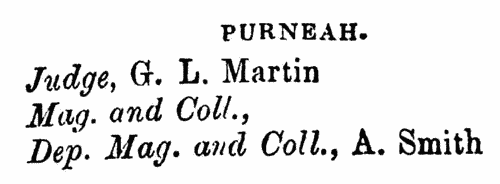
| Long-stay Paupers in Workhouses: Brixworth
(1861)
This comprehensive return by the Poor Law Board for England and Wales in July 1861 revealed that of the 67,800 paupers aged 16 or over, exclusive of vagrants, then in the Board's workhouses, 14,216 (6,569 men, 7,647 women) had been inmates for a continuous period of five years and upwards. The return lists all these long-stay inmates from each of the 626 workhouses that had been existence for five years and more, giving full name; the amount of time that each had been in the workhouse (years and months); the reason assigned why the pauper in each case was unable to sustain himself or herself; and whether or not the pauper had been brought up in a district or workhouse school (very few had). The commonest reasons given for this long stay in the workhouse were: old age and infirm (3,331); infirm (2,565); idiot (1,565); weak mind (1,026); imbecile (997); and illness (493). MULLIGAN. Cost: £6.00.  | Sample scan, click to enlarge

| Residents and Traders in Birmingham
(1861)
William Cornish's Corporation General and Trades Directory covered Birmingham, Coventry and the towns of the Black Country. The Birmingham section contains both street lists and this general alphabetical directory. MULLIGAN. Cost: £4.00.  | Sample scan, click to enlarge
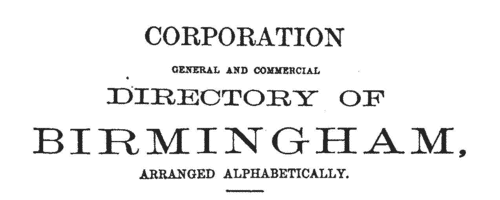
| Masters of English Merchantmen at St Thomas (1862)
The custom house at St Thomas, a Danish colony in the West Indies, issued daily lists of ships entered and cleared, which were published as the Marine Register in the twice weekly polyglot newspaper St Thomae Tidende. The reports of entries give precise date of arrival, nationality, type and name of the vessel (sailing ships in italics, steamships in capitals), the captain's surname (in bold), and whence the ship had come, sometimes adding a brief note about the cargo. The lists of ships cleared for departure have similar details, but with the ship's proposed destination. St Thomas was an important harbour not only serving inter-island Caribbean trade, and trading with England and the north and south American colonies, but also as an entrepot or intermediate destination, ships leaving with goods imported from elsewhere. A large proportion of the shipping was English, virtually all the steamers flying the Red Ensign.
MULLIGAN. Cost: £8.00.  | Sample scan, click to enlarge
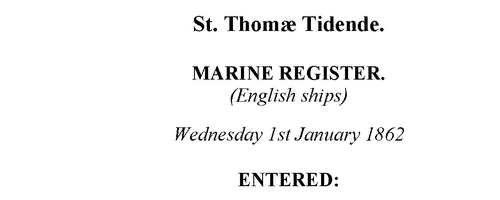
| Boys entering Cheltenham College
(1863)
Cheltenham College 'was founded in order to provide for the sons of gentlemen a Classical, Mathematical, and General Education of the highest order, on moderate terms, in strict conformity with the principles and doctrines of the Church of England.'
Andrew Alexander Hunter, the college registrar, compiled the first edition of the College Register in four parts from 1883 to 1886: these merely listed the boys by term of entry, with their dates of birth and names and addresses of their fathers. Circulars were also sent out to all Old Cheltonians whose addresses were known, requesting additional details. On the basis of the returns from these and Hunter's further researches, this much fuller register was published in 1890.
The information after each boy's name is given (where known and applicable) in this format: father's full name and address as of the time the boy entered the college; class and department on entering the college (classes being number from 1 downwards, and these again divided into A and B, some into C and D, others into P (Principal's side) and V. P. (Vice-Principal's side) - 1A was the highest class in each department: besides this, certain others were called Addiscombe, Woolwich, Civil, Direct, Line, Sandhurst, Naval, Special, Preparatory, Latin, and India Civil) and the same on leaving, name of Boarding House (or 'Day Boy'), scholastic and athletic honours attained at the college, and subsequent career (including date and place of death, or present address in 1890, if known).MULLIGAN. Cost: £4.00.  | Sample scan, click to enlarge
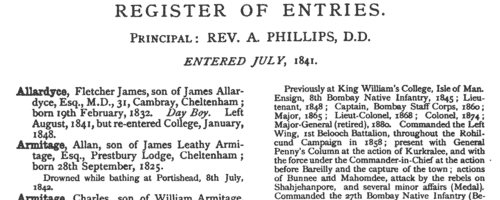
| Missionaries and contributors
(1864)
The Evangelical Magazine and Missionary Chronicle records the work of Christian missionaries throughout the world, and of the supporting missionary societies collecting money for the work in the British Isles. Contributions are listed by congregation, and by family members making donations.MULLIGAN. Cost: £8.00.  | Sample scan, click to enlarge
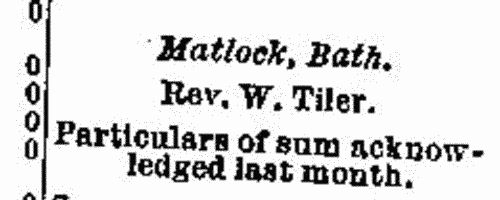
|
Research your ancestry, family history, genealogy and one-name study by direct access to original records and archives indexed by surname.
|













